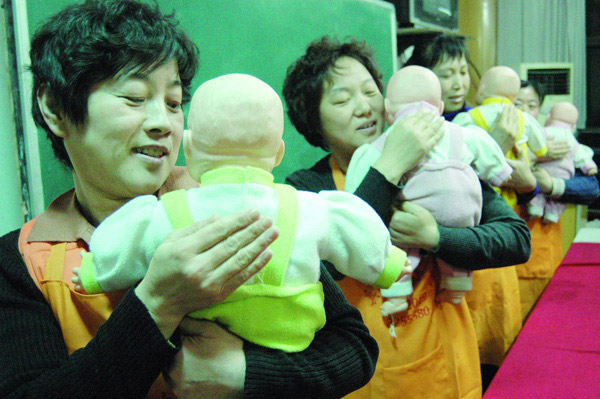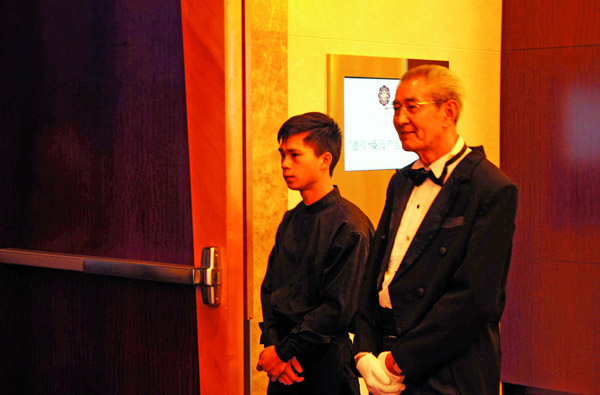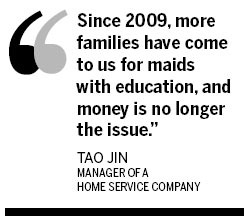Playing house for others
 |
|
A trainee pours wine at the UK Butler Guild in China, which provides butler services to families, hotels and properties. Provided to China Daily |
 |
|
Women carrying dolls participate in a family service competition in Jinan, Shandong province. Zhang Zhengxian / For China Daily |
 |
|
A young man is trained by a senior employee from the UK Butler Guild in China. Provided to China Daily |

Demand for well educated maids and nannies is increasing, as are the wages for successful applicants. Zhang Yue reports in Beijing.
It is 7 am and Wu Guiru lightly knocks on the door of the master bedroom to let her employer know it is breakfast time. If the door is not answered after three knocks, Wu leaves and comes back later. The 50-year-old, a graduate of Heilongjiang University and formerly a middle school teacher and kindergarten owner, hadn't even considered working as a full-time family maid before she came to Beijing in 2006.
She is happy about the transformation in her fortune, as she earns 7,000 yuan ($1,100) a month, about the same as a Beijing white-collar worker, and additionally does not need to pay for rent or food.
House keeping and babysitting jobs have gone from being a role filled primarily by poorly paid migrant workers with good cooking and cleaning skills, to being well paid early educators and high-class maids.
"People understand what an important influence we have on kids," Wu says. "That's why employers look for better educated, well-behaved employees, even if they are much more expensive."
"Since 2009, more families have come to us for maids with education, and money is no longer the issue," says Tao Jin, manager of Wuyou Home Service Company that Wu works for in Beijing.
"Yet the number of maids with good education is still limited."
Tao has a master's degree in computer science from Peking University, while the company has 2,000 employees, ranging from babysitters to domestic help and maids. Only 2 percent of them went to universities and they are the better-paid employees.
Wu was among the first batch of college graduates after the resumption of the college entrance examination in 1978.
She originally came to Beijing with her husband, and soon found a teaching job at a private elementary school with both Chinese and foreign students.
She changed career when a friend asked her to do a favor and babysit some kids from a rich family.
Though initially skeptical, she felt at home after meeting the parents, who were in their late 30s and graduates from Beijing University of Aeronautics and Astronautics. They had an 11-year-old daughter and a son of 16 months, but were too busy to teach them.
They asked for care and early education for the boy. The girl, in fourth grade at primary school, appeared to be spoiled and threw a dictionary in Wu's face when Wu tried teaching her to spell.
Even so, she took the job, which paid 3,800 yuan ($600) per month, doubling the average salary for babysitters at that time.
She was amazed by the couple's two-story apartment and garage with two BMWs.
"Working in such a place felt unreal," she says. "I lived with the family and spent all my time with the children, but I was never part of the family."
Wu stayed in the job for three years, working six days a week. She had no idea what the family did until the day she left, and never asked how much money they earned.
"Such questions are not allowed," Wu says. "Once you are with these rich families, you have to know what to, or what not to say. Nobody would hire me if I pried into their private lives."
In 2011, Wu became a steward, managing four maids for a family.
"The negative thing about family service is that you are giving up your own life," says Mountain Shi, standing vice-president of UK Butler Guild in China, a company that trains and provides butler services to families, hotels and properties.
"The number of people asking for well-qualified family service employees is increasing. When we started in 2006, only hotels asked for such service training. Now, we receive eight family consultancies every year."
The company holds two training sessions a year, charging 7,000 yuan each. Senior butlers from the UK Butler Association give classes.
"Most of our students stay in the business," Shi says. "Those serving families can earn on average 400,000 yuan ($63,500) a year."
But the good money often comes with the cost of missing out on family life. The company's two senior British butlers, both in their late 50s, are still single.
Wang He, a 28-year-old who graduated from Jilin Agriculture University, studied housekeeping because her grades were too low for other courses. She worked as a maid for a rich family for just a month.
"It felt like prison," she says. "My whole world was restricted to the house. Many bosses I know do not allow the maid to leave the house without permission. I had to be very loyal to the family. But what about my own dreams? And my personal life?"
"On the first day, when I knelt down and cleaned the floor of the living room, I felt confused," she says. "I have a bachelor's degree, and I did not go to college to clean floors."
She now teaches family service at a training institute in Shijingshan district, Beijing, earning 5,000 yuan a month. Her sister, 22, is studying housekeeping at college.
"She does not mind doing the job as it is well-paid for a 20-year-old," Wang says.
In a recent online survey by Sina Weibo about whether college students wanted to become maids, 34.5 percent said they would be interested if they earned more than 4,000 yuan a month, and were given health insurance as well as weekends off.
"Demand for high-end family maids will definitely continue growing," says Shi, the manager.
"What we hope for most is trainees with an international educational background who speak more than one language and are used to other cultures. We are trying to have our professionals reach the standard of British butlers, and our employees will earn even more money."






















